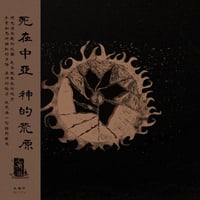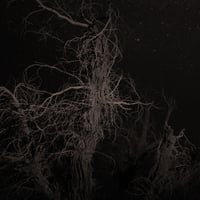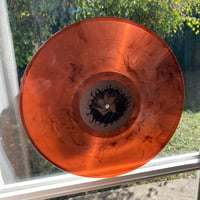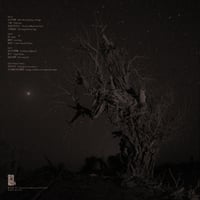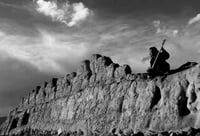WV076 王嘯 Wang Xiao (CN) - 黑馬河的兒子 The Son of Black Horse River DLP
●●●IN STOCK, READY TO SHIP
●●●BANDCAMP DL CODE INCLUDED
▼WV019/WV076:
王嘯 Wang Xiao - 黑馬河的兒子 The Son of Black Horse River
Ballads of a troubadour from Gobi Desert in Central Asia.
-12" double vinyl (amber marble or black)
- Heavy gatefold cover w* obi & lyrics
- Postcards set, including photos only available in the previous limited cloth package CD edition
- One more bonus track than the previous CD version, only on this vinyl edition, 2LP total length: 84min
- Limited to 280 copies (amber marble) / 120 copies (black)
●We have about 40 CDs (in bulk, no digipak) from the previous CD pressing, if you want one, leave a note when placing the LP order, and we'll add it to your parcel for free (when stock lasts).●
▼
“His voice is original, it’s a blend of a shaman and the characteristics of the nomadic people. His way to play dombra is unusual, not with the finger but a plectrum, that makes the music fiercer and more rhythmic. Wang Xiao spent many years in Lhasa, he also put the rhythm of the monks chanting into his music, all these make his works dialoguing with the sun and the earth, it contains the essence from the land and the passing time.”
「那是個嗓音和為人都硬朗通透的黝黑漢子。他的演唱是融合了薩滿巫師和遊牧民族特點,自己獨創的一種唱法,他的冬不拉演奏一反常規的輪指與轉腕,而是用撥片,使其殺傷力、節奏感更強。其中融合的喇嘛誦經的節奏、多年的拉薩生活使王嘯的作品與土地和陽光通融起來,它包含了太多的歲月和土地的積澱。」 。
- Zhang Zhi 張智(旅行者樂隊)
“I came up with the nickname ‘Folk shaman’. I met Wang Xiao back in 2002-2003, when he was still a rock-n-roll young guy in Shenzhen, but his mental state was like channeling with a shaman or a minstrel. It may have something to do with his life experience, mysterious and unique.”
「『民謠巫師』這個綽號是我起的,我是2002—2003年間認識王嘯的,當時在深圳,他還是標準的搖滾青年形象,但他的精神狀態就像薩滿巫師和遊吟者通靈一般,這或許和他的生活經歷有關系,有一種神秘、獨特的氣質。」
- Wu Junde 吳俊德(旅行者樂隊,前舌頭樂隊)
Wang Xiao was born in Karamay, Xinjiang in 1966. His parents are oil exploration workers. From childhood, he followed his parents to live and grow up in the wilderness of Gobi Desert. In 1989 he quitted his oil field job and started traveling as a troubadour. He has lived in Tibet for 10 years and now resides in Yunnan. As Wang Xiao said: “In my memory, there is no ‘home’ concept, just keep moving from place to place”. The album is clearly not “indie city folk”, nor is it “world music”. However, after years of immersion in the vein of Central Asian culture, the influence of traditional music from various Central Asian regions is obvious. The whole album is dark and deep, like the rocks in the desert. The occasional overtone singing plays well with the dombra tone, the musician is seeking the divine nature of the universe. “Folk singers in the past were poets and sorcerers themselves. They could only sing after divination and sacrifice, or by helping people to predict diseases, fortunes, planting and family affairs. Folk singers should be the ones who atone for the lives.”
The symbolic and poetic lyrics are also an important part for the album. With Lu (Heartless/Vergissmeinnicht/Mandarava), Edward Sanderson and Josh Feola's help, we included the full Chinese lyrics with English translation, it will help the listener to have a better understanding of Wang Xiao’s music.
The album was recorded in the winter of 2007 in Beijing. “At that time, it was just me, Wu Junde and Wu Tun to do this recording. They bought me some wine, we drank them and recorded the album (dombra and vocal) for only two hours, then I went back to Tibet right after.” Wu Junde and Obul added tanbur, mouth harp, more vocals and percussions afterward. “We didn’t feel it’s a very good album at first. The tempo is not always right because we didn’t use a metronome, but as you listened to it for a long time, it was great. It's a record that can't be repeated, because it's made at one go, and it's very straight.”
Previously self-published as CDr in 2010, now we reissue this album as a Ten Year Anniversary Edition, with new graphic design and a bonus track “Refugee of Faith on the Ancient River Bank” recorded in 2016. All tracks are carefully remastered by our friend Cyril Meysson.
(Update 2023: double LP version out in July.)
“Black Horse River, for me, is my real motherland.” – Wang Xiao
王嘯,1966年生於新疆克拉瑪依,父母為石油斟探工作者,自幼跟隨父母在荒原、戈壁、沙漠生活,成長度日。曾當過石油工人,1989年離職,自此吟游四方,曾在西藏居住十年,現居雲南。如王嘯所說:「在我的記憶中,沒有什麽『家』的概念,只是不停的搬動,變換著不同的地方。」這張專輯顯然不是「城市民謠」,也並不是所謂的「世界音樂」或「民族音樂」。但是多年浸淫在中亞文化的血液之中,中亞各民族傳統音樂的影子顯而易見,我更想稱之為一張音樂人自己的Ballad作品。整張專輯黑暗、沉重,像沙漠中的巨石拍打着大地,若隱若現的泛音唱法配合着冬不拉的刷彈,音樂人依存在天地萬物的神性之間。「過去的民謠歌手本身就是詩人、巫師。他們要為人們的病痛、禍福、栽種、家族的事、以前的恩怨等進行占卦、祭祀、問天後才可以歌唱,民謠歌手應該是生命的贖罪者。」如詩歌一般凝練、寫實卻又充滿象徵性的歌詞也是這張專輯重要的一部分,在魯創(Heartless/Vergissmeinnicht/Mandarava)、Edward Sanderson和Josh Feola的細心幫助下,我們在這次再版中收錄了完整的中文歌詞和英文翻譯,讓聽者更能體會音樂所傳達的含義。
這張專輯錄製與2007年冬天的北京,「當時錄音就我和吳俊德、吳吞,他倆給我買了幾瓶酒,喝完就錄了,用了兩個小時,第二天我就回到了西藏。」,後來吳俊德和吾不力在後期又加入了彈撥爾、口弦、和聲和手鼓。「這張專輯猛一聽不是很好,有很多錯拍子,因為當時沒有采點,但聽的時間長了,就很棒,越聽越好。是一張不能重復的唱片,因為它一氣而成,氣口很正。」這張專輯在2010年由音樂人自己出版了CDr,到現在已經十年。這次的十週年再版,巫唱片設計了全新的Digipak CD,加入了磁帶版本,並多附一首2016年新作《先河邊的信仰難民》,也邀請了多次合作的法国母帶師Cyril Meysson重製了母帶,在保留原始錄音氣質的同時也提升了整體的聆聽感受。
(Update 2023:雙黑膠版本7月發行)
「『黑馬河』對我來說,就是我真正的祖國。」- 王嘯
(部分文字摘自《通俗歌曲》2011年3月號《黑馬河的兒子 - 王嘯專訪》,作者:陳郁)
A1 89年的舞 1989, The Grand Piece of Dance 04:17
A2 大雁 Wild Geese 06:57
A3 黑馬河的兒子 The Son of Black Horse River 05:15
A4 古格酒鬼 The Drunkard from Guge 06:02
B1 魂 Spirits 08:58
B2 翻唱 Cover Song 06:18
B3 狼來了 Here Come the Wolves 06:09
C1 東方的夢魘 The Eastern Nightmare 08:57
C2 影子 Vague Shadow 08:09
C3 遠走他鄉 The Long Exile 06:18
D1 Bonus Track: 塔里木河 Tarim River (Live version) view
D2 Bonus Track: 先河邊的信仰難民 Refugee of Faith on the Ancient River Bank view
releases July 7, 2023
詞/曲/唱:王嘯
(除《大雁》詞:撒韜、王嘯,《翻唱》原唱:李世榮,詞/曲:雷振邦,改編:王嘯)
冬不拉:王嘯
吉他:吳俊德(曲A1)
口弦:吳俊德(曲A4)
和聲:吳俊德(曲A3、B1、B3、C1、C2、C3)
彈撥爾:吳俊德(曲B1、C1)
鼓:吾不力(曲A1、A2、A3、B1、B3、C1、C2、C3)
錄音:吳唯一(中國北京,2007年冬),專輯2010年由音樂人獨立出版發行
附加曲目:
《塔里木河》2015年五月錄制於匈牙利布達佩斯國家音樂藝術節
吉他:Both Miklos
低音貝斯:Novak Csaba
欽巴龍揚琴:Lukacs Mikos
鼓:Des Andras
冬不拉、人聲:王嘯
開場人聲:央吉瑪
錄音:Barnabás Hidasi & Nicky Almasy
《先河邊的信仰難民》錄製於2016年
冬不拉、人聲:王嘯
馬頭琴:GaWa
鼓:陳志鵬
重制母帶:Cyril Meysson(法國聖艾蒂安)
歌詞英文翻譯:魯創(Heartless/Vergissmeinnicht/Mandarava)
校對:Edward Sanderson & Josh Feola
封面畫作:王元清,攝影:李銘,設計:若潭
特別感謝:吳吞、吳俊德
Music/Lyrics/Vocals: Wang Xiao
(Except "Wild Geese" Lyrics by Sa Dao & Wang Xiao, "Cover Song" Original singer Li Shirong, Music/Lyrics by Lei Zhenbang, rearranged by Wang Xiao)
Dombra: Wang Xiao
Guitar: Wu Junde (Track A1)
Mouth Harp: Wu Junde (Track A4)
Chorus: Wu Junde (Track A3, B1, B3, C1, C2, C3)
Tanbur: Wu Junde (Track B1, C1)
Percussions: Obul (Track A1, A2, A3, B1, B3, C1, C2, C3)
Recorded by Wu Weiyi in Beijing, China, winter 2007, previously self-released in 2010
Bonus tracks:
"Tarim River"
Recorded in May 2015, at National Music and Arts Festival in Budapest, Hungary
Guitar: Both Miklos
Double bass: Novak Csaba
Cimbalom: Lukacs Mikos
Percussions: Des Andras
Dombra & Vocals: Wang Xiao
Intro vocal: Yunggiema
Recorded by Barnabás Hidasi & Nicky Almasy
"Refugee of Faith on the Ancient River Bank"
Recorded in 2016
Dombra & Vocals: Wang Xiao
Morin khuur: GaWa
Percussions: Chen Zhipeng
Remastered by Cyril Meysson in Saint-Étienne, France
English lyrics translated by Lu (Heartless/Vergissmeinnicht/Mandarava)
Proofread by Edward Sanderson & Josh Feola
Cover art by Wang Yuanqing
Photography by Li Ming
Design & Layout by Ruò Tán
Special thanks to Wu Tun & Wu Junde
CD版發行日期:2020年5月20日,小滿(十週年紀念版)
CD version released on May 20, 2020 (Ten Year Anniversary Edition)
© & ℗ WV Sorcerer Productions 2019-2023
wvsorcerer.bandcamp.com
www.facebook.com/wvsorcerer
www.youtube.com/c/wvsorcerer
Instagram: @wv_sorcerer_productions
巫唱片

